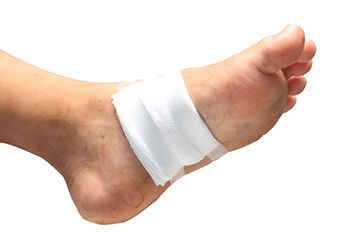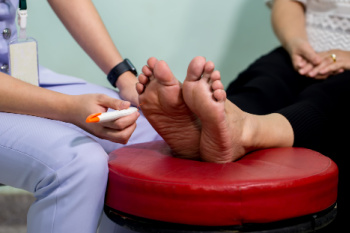
Stepping on a sharp object can lead to a puncture wound, which is different from a simple cut or scrape. These injuries often push debris deep beneath the skin, increasing the risk of infection. Even if the wound seems small, bacteria may have entered through the opening and caused hidden damage to deeper tissues. Common objects that cause these injuries include nails, glass, or splinters, often encountered outdoors or in work areas. Symptoms may not appear right away, but swelling, warmth, or pain may develop hours later. Footwear may prevent some injuries, but thin soles or walking barefoot raise the risk. Proper cleaning and medical evaluation are important to avoid serious complications such as abscesses or bone infections. If you have stepped on something sharp and the discomfort continues or worsens, it is suggested that you see a podiatrist to assess the injury and prevent further problems.
Wound care is an important part in dealing with diabetes. If you have diabetes and a foot wound or would like more information about wound care for diabetics, consult with One of our podiatrists from Diagnostic Foot Specialists. Our doctors will assess your condition and provide you with quality foot and ankle treatment.
What Is Wound Care?
Wound care is the practice of taking proper care of a wound. This can range from the smallest to the largest of wounds. While everyone can benefit from proper wound care, it is much more important for diabetics. Diabetics often suffer from poor blood circulation which causes wounds to heal much slower than they would in a non-diabetic.
What Is the Importance of Wound Care?
While it may not seem apparent with small ulcers on the foot, for diabetics, any size ulcer can become infected. Diabetics often also suffer from neuropathy, or nerve loss. This means they might not even feel when they have an ulcer on their foot. If the wound becomes severely infected, amputation may be necessary. Therefore, it is of the upmost importance to properly care for any and all foot wounds.
How to Care for Wounds
The best way to care for foot wounds is to prevent them. For diabetics, this means daily inspections of the feet for any signs of abnormalities or ulcers. It is also recommended to see a podiatrist several times a year for a foot inspection. If you do have an ulcer, run the wound under water to clear dirt from the wound; then apply antibiotic ointment to the wound and cover with a bandage. Bandages should be changed daily and keeping pressure off the wound is smart. It is advised to see a podiatrist, who can keep an eye on it.
If you have any questions, please feel free to contact our offices located in Houston, TX, Houston, TX, and Bryan, TX . We offer the newest diagnostic and treatment technologies for all your foot care needs.

Peripheral neuropathy can significantly impact the health of the feet, making them vulnerable to serious complications. When sensory nerves in the lower extremities are damaged, it can result in the loss of the ability to feel pain, temperature, or pressure, especially in the toes and soles. This loss of sensation in the feet, termed peripheral neuropathy, can lead to unnoticed injuries, such as cuts, blisters, or pressure points from shoes, which may worsen over time. Motor nerve damage can cause muscle weakness or foot drop, which affects walking and balance, increasing the risk of falls or sprains. In more severe cases, muscle wasting in the feet may lead to deformities. A podiatrist can evaluate nerve function, identify pressure areas, and recommend proper footwear or orthotic support to prevent further injury. In advanced cases, a podiatrist may suggest surgery to relieve nerve compression or correct deformities caused by neuropathy. If you have any of these symptoms, it is suggested that you schedule an appointment with a podiatrist for guidance in managing this condition.
Neuropathy
Neuropathy can be a potentially serious condition, especially if it is left undiagnosed. If you have any concerns that you may be experiencing nerve loss in your feet, consult with One of our podiatrists from Diagnostic Foot Specialists. Our doctors will assess your condition and provide you with quality foot and ankle treatment for neuropathy.
What Is Neuropathy?
Neuropathy is a condition that leads to damage to the nerves in the body. Peripheral neuropathy, or neuropathy that affects your peripheral nervous system, usually occurs in the feet. Neuropathy can be triggered by a number of different causes. Such causes include diabetes, infections, cancers, disorders, and toxic substances.
Symptoms of Neuropathy Include:
- Numbness
- Sensation loss
- Prickling and tingling sensations
- Throbbing, freezing, burning pains
- Muscle weakness
Those with diabetes are at serious risk due to being unable to feel an ulcer on their feet. Diabetics usually also suffer from poor blood circulation. This can lead to the wound not healing, infections occurring, and the limb may have to be amputated.
Treatment
To treat neuropathy in the foot, podiatrists will first diagnose the cause of the neuropathy. Figuring out the underlying cause of the neuropathy will allow the podiatrist to prescribe the best treatment, whether it be caused by diabetes, toxic substance exposure, infection, etc. If the nerve has not died, then it’s possible that sensation may be able to return to the foot.
Pain medication may be issued for pain. Electrical nerve stimulation can be used to stimulate nerves. If the neuropathy is caused from pressure on the nerves, then surgery may be necessary.
If you have any questions, please feel free to contact our offices located in Houston, TX, Houston, TX, and Bryan, TX . We offer the newest diagnostic and treatment technologies for all your foot care needs.

Modern soccer shoes are designed to enhance performance through lightweight materials and close-fitting construction. However, these same features may increase the risk of foot and ankle injuries. Thin soles and limited cushioning can lead to stress-related conditions, while narrow toe boxes may cause irritation or pressure on the forefoot. Playing on artificial turf in cleats that do not provide enough traction or support can also contribute to joint or muscle strain. Improvements in design may include better shock absorption, more anatomical shaping, and options that accommodate different foot types. Balancing agility with protection remains a challenge for manufacturers, but updated designs could reduce the occurrence of common foot injuries seen in soccer players. If you have foot or ankle pain related to sports activity, it is suggested that you see a podiatrist for a diagnosis and appropriate treatment.
Sports related foot and ankle injuries require proper treatment before players can go back to their regular routines. For more information, contact One of our podiatrists of Diagnostic Foot Specialists. Our doctors can provide the care you need to keep you pain-free and on your feet.
Sports Related Foot and Ankle Injuries
Foot and ankle injuries are a common occurrence when it comes to athletes of any sport. While many athletes dismiss the initial aches and pains, the truth is that ignoring potential foot and ankle injuries can lead to serious problems. As athletes continue to place pressure and strain the area further, a mild injury can turn into something as serious as a rupture and may lead to a permanent disability. There are many factors that contribute to sports related foot and ankle injuries, which include failure to warm up properly, not providing support or wearing bad footwear. Common injuries and conditions athletes face, including:
- Plantar Fasciitis
- Plantar Fasciosis
- Achilles Tendinitis
- Achilles Tendon Rupture
- Ankle Sprains
Sports related injuries are commonly treated using the RICE method. This includes rest, applying ice to the injured area, compression and elevating the ankle. More serious sprains and injuries may require surgery, which could include arthroscopic and reconstructive surgery. Rehabilitation and therapy may also be required in order to get any recovering athlete to become fully functional again. Any unusual aches and pains an athlete sustains must be evaluated by a licensed, reputable medical professional.
If you have any questions please feel free to contact our offices located in Houston, TX, Houston, TX, and Bryan, TX . We offer the newest diagnostic and treatment technologies for all your foot and ankle needs.

